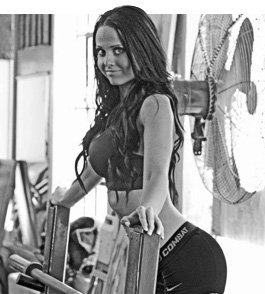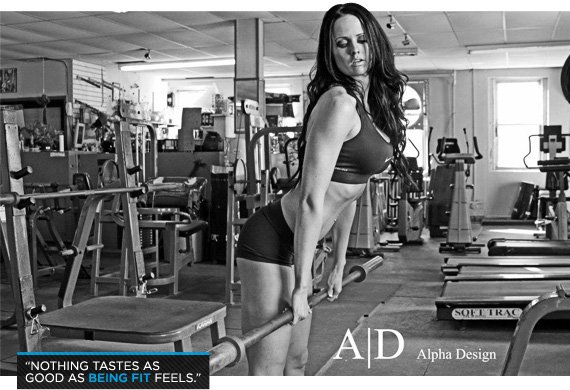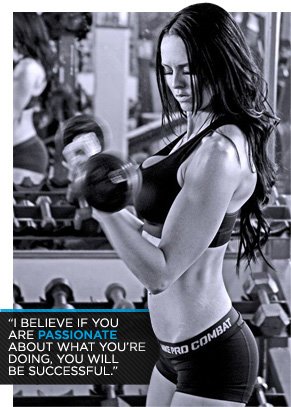It's a tale as old as time: The small-town girl migrates from her rural roots to the big city. Justine Moore made the leap from Wisconsin to New York City, and started two careers simultaneously.
By day, she's a personal trainer who uses her training in psychology and her own experiences as an overweight child to become the voice-inside-the-head of her diverse stable of clients.
By night, she's a nationally qualified NPC bikini competitor and fitness model.
Congratulations to Justine Moore, Bodybuilding.com's Personal Trainer of the Month!
What sets Justine apart from long list of quality trainers? Read on and discover!
I grew up in Waukesha, Wisconsin. As a kid, I was far from athletic. I was more into music and arts than sports, and I loved my sweets—as I still do—so I was overweight.
As a teenager I starting running a lot and joined dance classes, and I started to learn about nutrition. I lost the weight, but I think having had that experience created this inner fear of being fat and an obsession with the scale.

I moved to New York at 18 years old to attend Hofstra University, where I earned my bachelor's degree in psychology.
Unfortunately my first year of college involved too much drinking and pizza and no time in the gym—and it showed!
Again, I found myself unhappy with my body, uncomfortable with my weight, and desperate for a change. During that time I tried just about every fad diet that existed, depriving myself of calories and key nutrients, along with excessive hours of cardio to lose weight. I would always lose the weight, but it always came right back.
At that time I started working the front desk at a gym near school. I began learning about weightlifting and proper nutrition. I started to understand how to treat my body right, and to appreciate the difference between "skinny" and "fit."
I started reading magazines like Oxygen and Muscle & Fitness Hers and articles on sites like Bodybuilding.com. I was totally captivated by fitness and decided to get certified to become a trainer.
I got certified to become a personal trainer with NESTA when I was 21. I enjoyed working in the gym environment and had a newfound passion for fitness, so I thought, why not pursue a field of work that I love?
I believe if you are passionate about what you're doing, you will be successful.

I wouldn't say I have a specific training style. I train each client differently depending on their fitness level and goals. With my clients, I incorporate everything from heavy weight training to plyometrics, circuit training, track drills, boxing, interval training, and more.
One thing I do with every client is keep them moving! I keep their rest periods to a minimum by using supersets, trisets, intervals, and circuits. This way they burn the most fat and calories to get quicker results.
It's my job to push my clients to a level to which they won't push themselves, but also to try to keep sessions enjoyable so exercise becomes something they want to do, not just a chore.
I had a client come to me at 69 years old, overweight, with a shoulder injury and arthritis in her knees and ankles. She had trouble using stairs and could only stay on the elliptical for about a minute at a time.
At first I was overwhelmed, thinking: What on earth will I do with this person for two hours each week? We started slow, working from what she could do. I had her sit on a stability ball to slowly strengthen her core. We also used a lot of resistance bands to work her muscles without aggravating her arthritis.
I trained this client two times per week for a year, and by the end of the year she was able to do squats, push-ups and planks! She was able to stay on the elliptical for 30 minutes or more, and she could lift weights five times heavier from when we started. She lost more than 30 pounds in a year, and best of all, she was able to keep up with her grandchildren.
Training this client started off as one of my biggest challenges, but in the end was one of the most rewarding experiences I've had as a trainer. It taught me to approach client and do my best to fully understand their personal strengths, limits, and the core reason they've come to me, and to use that background to deliver the best possible fitness program for that individual.
I consider all of my clients notable! But the clients who make the most progress are those who take the information and tools I give them and apply them to their everyday lives outside our sessions.
I tell clients there are 168 hours in a week, and I can only be with them for 1-3, so they have to do their homework! I like to be that little voice in the back of their mind saying, "Don't have that cookie—it's not worth it!" or, "You can do it: 3 more reps!"
My programs differ for each client, and I continuously make changes to each client's training and diet plans so they don't plateau or get bored with the training.
My nutritional programs are centered around natural, wholesome foods and good habits that a client can continue for a lifetime. I tell them it's not a diet, it's a lifestyle.
I believe in a balance of lean proteins, slow-digesting carbohydrates, and healthy fats, along with plenty of fruits, vegetables and water.

Starting an exercise program without changing their food habits. Unhealthy eating habits lead to slow-moving results, a lack of nutrients for proper recovery, and lower energy levels make it harder to push through workouts
Another big mistake is getting in the habit of working out only when we meet. Why invest money in a trainer if you're not willing to put in the work to maximize results? If a client works out with me 1-2 times per week, it's a great start, but they must exercise on their own during the week to see real changes.
Other clients think they should lose weight first and then hire a trainer to help them "tone up." Wrong! This is such a common misconception. Muscle does not turn into fat, and fat can't be turned into muscle. Incorporating both cardio and strength workouts will boost your metabolism way more than cardio alone, making it easier to lose fat.
A trainer is so key at the start of a fitness program to show you the proper way to perform exercises and prevent injury.
First: Not discussing nutrition with clients from day one. If you don't emphasize the importance of good eating habits, you sell your clients short when it comes to results.
Second: One-size-fits-all programs. Every person has different needs and different goals, and a good fitness program should reflect that.
With my online clients, I get them going on a full diet, training, and supplement program to follow. Then we keep in touch through email, text, Facebook, or Skype and make modifications based on weekly progress photos and measurements.
As for the clients I see in person, it depends on how often we meet and the
person's goals and background
with exercise. I start all my clients
off with tips for better nutrition
and lifestyle changes.
For those clients who have specific goals and can't meet with me more than once per week, or who are already training and eating right and just want to take it to the next level, I will put them on a full program to follow.
For clients new to fitness, I start off slower, first focusing on establishing good habits and learning proper exercise form and technique.
I found that dumping too much information on someone brand-new to the gym can be overwhelming and intimidating.
I try to make sure all my clients have a solid foundation so they can make lasting changes in their lives.
I try to lead by example and share what I learned from my own fitness journey. I try to always be honest, but encouraging. Getting results means lots of hard work and discipline, but it's so worth it!
I always tell them "Nothing tastes as good as being fit feels!" I remind them to look at the big picture and make decisions based on what is more important to them: a few minutes of satisfaction from eating a treat, or feeling confident in your skin, and loving your body.
Looking and feeling your best lasts 24/7!
Not exactly. I train clients based on their current level of fitness and goals. However, because women have more fat-storing hormones and a smaller caloric output due to size, it's usually harder for women to lose body fat and weight.
When that is the case, I put extra focus on their cardio and nutrition.
My overall approach and philosophy for training has stayed the same, but I am constantly learning new techniques and tricks from my own years of training.
I also feel I put much more emphasis on my clients' nutrition now than when I started training, because I've seen first-hand how much diet really affects body composition.

Before I start with a client I try to get a complete understanding of this person, including their medical history, exercise background, occupation and lifestyle, support system, goals, and their underlying motivation for training with me.
Once I can get a clear picture of each client's strengths and weaknesses—both physically and mentally—I can decide which approach will work best and develop a program tailored for their needs.
I like the connection I have when I train female clients. Females have so many misconceptions when it comes to working out and eating right.
Lots of women fear that lifting weights and consuming a high-protein diet will give them big, bulky muscles, so they spend hours doing low-intensity cardio on the elliptical or bike.
Then they wonder why they can't tone up! The truth is women have different hormones than men, so it's unlikely they would bulk up from weightlifting.
Weight training creates the toned arms, flat abs, and tight butt and thighs that every woman wants, not to mention that it improves posture and fights cellulite.
I love the opportunity I have to educate women about fitness. It's incredible to watch a woman go from being intimidated and clueless in the weight room to walking in with her head held high, asking the guy next to her if he's done in the squat rack so she can perform her deadlifts. That's so empowering!
Being a successful personal trainer is about so much more than writing a good workout. It's about human behavior, and being able to give your clients the knowledge and motivation to change their habits.
In addition to having my certifications in both exercise and nutrition, I also earned my bachelor's degree in psychology from Hofstra University. Many people I come into contact with struggle with various types of disordered eating or body image issues, so I feel it's extremely important that someone in my position is well-equipped to handle these sensitive subjects.
My philosophy is that a healthy, lasting fitness transformation must be based on all three equally important pillars: exercise, nutrition, and a shift in behavior and mindset. I take a full-circle approach when working with clients, so we not only make changes in their performance and body composition, but also improve their self-confidence, self-image, and overall quality of life.
Thank you to Bodybuilding.com for featuring me as Personal Trainer of the Month!
Photography Credits: Spiro Angelo Photography and Alpha Design Photography.
